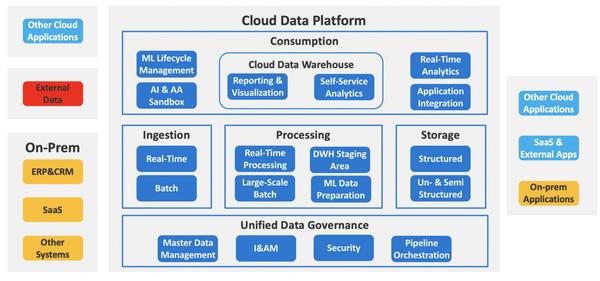Rohit Amarnath is CTO of Vertica, the Unified Analytics Platform, enabling predictive business insights based on a scalable architecture.
Today, one of the highest-profile topics in the entire technology industry is the underlying infrastructure for applications, especially for analytical workloads. Do the advantages of a single, highly-integrated public cloud stack outweigh the risks of vendor lock-in? Does a multicloud approach mean greater negotiating power but added complexity? Is it best to protect your data by deploying applications in a private, on-premises data center?
While all of these are very valid questions today, they soon won’t be.
Why It Soon Won’t Matter Where You Run Your Analytical Workloads
Public clouds have been gaining traction at an exponential rate over the last decade. It took time to convince skeptics that security and scale could be addressed as well as within enterprise data centers. Still, undeterred investors continued to pour money into all the public cloud providers to ensure that they could get the word out. The real explosion began when ISVs began to build out cloud-native applications, causing investors and customers to turn their attention to the many different applications showcased in the market. The public cloud providers found themselves heading toward a definition of somewhat indistinguishable commodity compute and storage hardware, leading them to expand into application development aggressively. This was especially true for analytics applications and data warehousing, given the very large datasets. The market saw a series of acquisitions to expand into platform-based offerings, including BI visualization tools, streaming and edge analytics and so much more, setting up the record growth we’ve seen from AWS, Google, Azure and others.
The next wave of change is rapidly approaching, driven by SaaS, microservices, containerization and Kubernetes and DataOps advances. Just like with an electrical grid, the next wave of analytical workloads will “plug in” to whatever compute/storage grid that makes the most sense at the time, whether it be location, pricing, regulations and more.
Best Travel Insurance Companies
ByBest Covid-19 Travel Insurance Plans
By
The Impact Of Not Caring Where The Workload Runs
Ultimately, you will maximize cost savings with an automated choice of optimized infrastructure. Imagine a world where you can evaluate and choose the most robust, highly scalable, advanced analytics and machine learning platform without any concern for which public cloud or on-premises private data center will support it. Combine this with automated administration, elastic scaling, auto-scheduling and a fully integrated set of analytics and machine learning, and we will find ourselves on a much more accelerated path to data-driven business insights and proactive analytics-driven actions.
Data democratization is a core business driver that ties into this analytics-anywhere focus. Suppose your company’s goals include unlimited concurrency and instant response times in delivering analytics. You want to provide analytics to anyone who wants it at any time. In that case, the transformation will require elasticity and performance optimization in the software itself, which is currently not a top priority for companies who make the most margin from compute hours. For too many vendors, data democratization comes at the cost of simply adding more cloud servers with little chance to optimize and prioritize queries. There needs to be a balance.
What Should Matter When You Choose A Cloud Database
In many corporations, there is no clear framework on how databases are selected. Business analysts often pick which solutions they want to adopt, and as usage increases, it drives adoption. Data scientists and business analytics bring knowledge about languages, visualization tools and analytics engines when they join a company and have preferences for the tools they know. Smart IT and data governance teams tend to consider other crucial factors like data governance, operational efficiency and cost control on an equal footing to deployment simplicity.
As you evaluate solutions for their capabilities and long-term cost to the organization, it’s essential to consider the six categories of how a cloud platform should behave:
• Deployment Options: Will the deployment options available on this cloud database support all of the workloads you want to run, now and in the future? This might include SaaS, hybrid cloud, on-premises and microservices.
• Storage And Access To Data: Will the database support combined data storage models, where data is in cloud object store, on-premises object store or any of the hundreds of other places it could be? Will it access and use the data for analytics without a costly load?
• Optimization And Speed: Will the database handle all your data now and all your data three years from now? Is it scalable and elastic? Can it load data fast enough and serve enough concurrent queries? Can you tune slow running queries, or is the only recourse to add costly compute?
• Analytics: Does the solution have the depth of analytics you need, from time-series, geospatial, machine learning and more? Can Python users easily leverage its data as SQL users?
• No Invoice Surprises: Does the solution allow you to clearly set limits on spend, or are you likely to get surprises at the end of the month?
• Secure: Does it offer a secure environment, including ISO 27001 certification and encryption, thereby protecting your critical data?
It’s only with a focus on what’s important will you come away with an analytical solution that is viable for decades to come.
Forbes Technology Council is an invitation-only community for world-class CIOs, CTOs and technology executives. Do I qualify?




